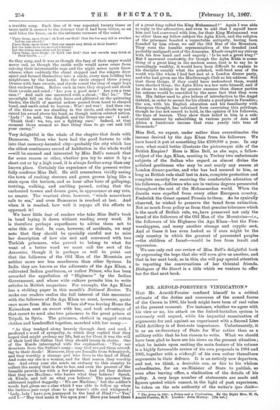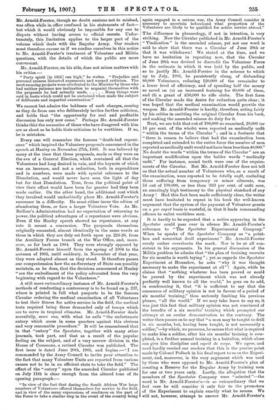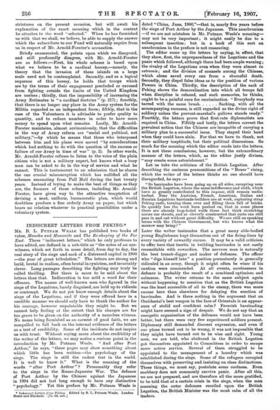MR. ARNOLD-FORSTER'S VINDICATION.*
HAD Mr. Arnold-Forster confined himself to a critical estimate of the duties and resources of the armed forces of the Crown in 1906, his book might have been of real value at the present moment. For instance, whether we agree with his view or no, his attack on the linked-battalion system is extremely well argued, while his impartial examination of arguments for and against an experiment with a Second Line Field Artillery is of first-rate importance. Unfortunately, it is as an ex-Secretary of State for War rather than as a military critic that he has chosen to write. What we should have been glad to have are his views on the present situation; what be insists upon making the main feature of his volume is a highly favourable review of his own proposals in 1904 and 1905, together with a rechaufe of his own rather threadbare arguments in their defence. It is an entirely new departure, and not, we think, a desirable one, or fair to his whilom subordinates, for an ex-Minister of State to publish, so soon after leaving office, a vindication of the details of his policy. A very large number of statements are made and figures quoted which cannot, in the light of past experience, he taken on the sole authority of the writer's ipso dint— The Array.in 1508: a Polies and a Vindication. By the Bight Hon. R. at Arnold-Forster, M.P. London John Murray. Me. net.]
Mr. Arnold-Forster, though no doubt anxious not to mislead, was often while in office confused in his statements of fact— but which it would obviously be impossible for any one to dispute without having access to official secrets. Unfor- tunately, this limitation applies to the larger part of the volume which deals with the Regular Army. Our readers must therefore excuse us if we confine ourselves in this notice to Mr. Arnold-Forster's treatment of Volunteer and Militia questions, with the details of which the public are more conversant.
Mr. Arnold-Forster, on his side, does not mince matters with his critics :—
" Party spirit [in 1905] ran high," he writes. "Prejudice and personal animus distorted arguments and warped criticism. The most amazing projects were attributed to the Minister by those who had neither patience nor inclination to acquaint themselves with
the proposals he had actually made Many things were said in haste which could not be sustained when made the subject of deliberate and impartial examination."
We cannot but admire the boldness of such charges, coming as they do from one who deliberately invites further criticism, and holds that "the opportunity for real and profitable discussion has only now come." Perhaps Mr. Arnold-Forster thinks th'at the memories of those who have disagreed with him arena short as beholds their criticism to be worthless. If so, he is mistaken.
Every one will remember the famous "death-bed repent- ance" which inspired the Volunteer proposals announced in the speech at Hanley on November 27th, 1905. It was believed by many at the time that these proposals, made as they were on the eve of a General Election, which contained all that the Volunteers had long desired in vain, and the keynote of which was an increase, and not a reduction, both in expenditure and in numbers, were made with special reference to the Dissolution, and would never have seen the light of day but for that Dissolution. True, from the political point of view their effect would have been far greater had they been made earlier. On the other hand, the additional cost which they involved would undoubtedly place Mr. Arnold-Forster's successor in a difficulty. He must either incur the odium of abandoning them, or face a larger Volunteer Vote. As Mr. Balfour's Administration had no expectation of returning to power, the political advantages of a repentance were obvious. Even if the Hanley speech showed no repentance, at any rate it meant a conversion. The proposals themselves originally emanated, almost identically in the same words as those in which they are duly set forth upon pp. 224-26, from the Auxiliary Forces branch at the War Office, and, more- over, as far back as 1904. They were strongly opposed by Mr. Arnold-Forster himself from the spring of 1904 to the autumn of 1905, until suddenly, in November of that year, they were adopted almost as they stood. It therefore passes our comprehension how the ex-Secretary of State can possibly maintain, as he does, that the decisions announced at Hanley "are the embodiment of the policy advocated from the very beginning with regard to the Volunteers."
A still more extraordinary instance of Mr. Arnold-Forster's methods of conducting a controversy is to be found on p. 237, where is printed in full what purports to be the famous Circular ordering the medical examination of all Volunteers to test their fitness for active service in the field, the medical tests required being those demanded only of troops which are to serve in tropical climates. Mr. Aimold-Forater deals scornfully, more suo, with what he calls "the unfortunate outcry which arose in some quarters against this obvious and very reasonable procedure." It will be remembered that in that "outcry" the Spectator, together with many other journals, took part, and that as a result of the popular feeling on the subject, and of a very narrow division in the House of Commons, a revised Circular was published. The first issue is dated June 20th, 1905, and begins :—" I am commanded by the Army Council to invite your attention to the fact that many Volunteer Units are reported from various causes not to be in an efficient state to take the field." The effect of the " outcry " upon the amended Circular published on July 11th is clear enough from the altered tone of its opening paragraph :— "In view of the fact that during the South African War large numbers of Volunteers offered themselves for service in the field, and in view of the many expressions of readiness on the part of the Force to take a similar step in the event of the country being again engaged in a serious war, the Army Council consider it necessary to ascertain beforehand what proportion of the Volunteers are likely to be qualified for active service abroad."
The difference in phraseology, if not in intention, is very striking. Now the Circular published in Mr. Arnold-Forster's " Vindication " is the amended reissue, yet not one word is said to show that there was a Circular of June 20th or that it was withdrawn ! We stated at the time, and we have no hesitation in repeating now, that the Circular of June 20th was devised to discredit the Volunteer Force in the estimate in which it was held by the public, and so to justify Mr. Arnold-Forster in the scheme to which up to July, 1906, he persistently clung, of disbanding 80,000 Volunteers, reducing 120,000 of the remainder to a lower level of efficiency, and of spending half the money so saved on (a) an increased training for 60,000 of them, and (b) a grant of 250,000 to rifle clubs. The first form of the Circular made the desire for reduction quite clear; it was hoped that the medical examination would provide the weapon. Mr. Arnold-Forster is hardly, therefore, acting fairly by his critics in omitting the original Circular from his book, and making the amended reissue do duty for it.
Next, we are told that out of 180,000 so examined, 29,000 (or 16 per cent, of the whole) were reported as medically unfit "within the terms of the Circular " ; and in a footnote that " there is reason to believe that had the examination been completed and extended to the entire force the number of men reported as me dically unfit would not have been less than 40,000." No doubt the words "within the terms of the Circular" are an important modification upon the balder words "medically unfit." For instance, sound teeth were one of the require- ments of the Circular. But Mr. Arnold-Forster does not tell us that the actual number of Volunteers who, as a result of the examination, were reported to be totally unfit, excluding those suffering from temporary or minor ailments, was 54 out of 180,000, or less than .333 per cent, of unfit men, an amazingly high testimony to the physical standard of any Army ! Had this fact been made sufficiently clear, the writer must have hesitated to repeat in his book the well-known argument that the system of the payment of Volunteer grants on a per caput basis is wasteful, in that it leads commanding officers to enlist worthless men.
It is hardly to be expected that a notice appearing in the Spectator could pass over in silence Mr. Arnold-Forster's reference to "The Spectator Experimental Company." When he speaks of the Spectator Company as "a point- less and somewhat droll experiment" Mr. Arnold-Forster surely rather overshoots the mark. Nor is lie at all con- sistent in his arguments. In his general discussion of the Militia problem he admits that "the plan of training recruits for six months is worth trying " ; yet as regards the Spectator Experiment at Hounslow, he asks "why it was thought necessary to make the experiment at all" ! Again, while he claims that "nothing whatever has been proved or could be proved by the experiment which was not already perfectly well known to all the world," he goes on to add, in condemning it, that "it is sufficient to say that the consensus of military opinion is not in favour of a period of six months' training," thus seriously limiting his previous phrase, "all the world." If we may take leave to say so, it was just this fact that military opinion was not convinced of the benefits of a six months' training which prompted our attempt at an ocular demonstration to the contrary. The writer then passes on to say that "a man may be taught to drill in six months, but, having been taught, is not necessarily a soldier,"—by which, we presume, he means that what is required to make him a soldier, after his six months' training is com- pleted, is a further annual training in a battalion, which alone can give him discipline and esprit de corps. We agree, and need hardly remind our readers that this is the precise point made by Colonel Pollock in his final report to us on the Experi- ment, and, moreover, is the very argument which was used by those who were opposed to Mr. Arnold-Forster's plan of creating a Reserve for the Regular Army by training men for one or two years only. Lastly, the allegation that the members of the Spectator Company were "selected "—the word is Mr. Arnold-Forster's—is so extraordinary that we feel sure he will consider it only fair to the promoters of the Experiment to explain exactly what he means. We will not, however, attempt to answer Mr. Arnold-Forster's.
strictures on the present occasion, but will await his explanation of the exact meaning which in the context he attaches to the word "selected." When be has furnished us with that we shall, we believe, be able to supply the answer which the subscribers to our Fund will naturally require from us in respect of Mr. Arnold-Fors ter's accusation.
Briefly enumerated, the points upon which we disagreed, and still profoundly disagree, with Mr. Arnold-Forster are as follows :—First, his whole scheme is based upon what we believe to be a cardinal heresy,---namely, the theory that the invasion of these islands on a large scale need not be contemplated. Secondly, and as a logical sequence of this heresy, he holds that troops which are by the terms of their engagement precluded or excused from fighting outside the limits of the United Kingdom are useless ; thirdly, that the impossibility of increasing the Army Estimates is "a cardinal doctrine" (p. 217) ; fourthly, that there is no longer any place in the Army system for the Militia regarded as an independent force; fifthly, that in the case of the Volunteers it is advisable to prefer quality to quantity, and to reduce numbers in order to have more money to spend upon what remains. Lastly, Mr. Arnold- Forster maintains, almost acrimoniously, that the difficulties in the way of Army reform are "social and political, not military,"—by which he means that those who interposed between him and his plans were moved "by considerations which had nothing to do with the question of the success or failure of our Army in time of war" (p. 2). In other words, Mr. Arnold-Forster refuses to listen to the voice of the plain citizen who is not a military expert, but knows what a busy man can be asked to do in the way of service and what he cannot. This is tantamount to an admission that he shares the one crucial misconception which has nullified all the schemes emanating from Pall Mall during the last twenty years. Instead of trying to make the best of things as they are, the framers of these schemes, including Mr. Arnold- Forster, have given way to the attractive temptation of devising a neat, uniform, bureaucratic plan, which would doubtless produce a fine orderly Army on paper, but which bears no relation whatever to practical possibilities under a voluntary system.








































 Previous page
Previous page